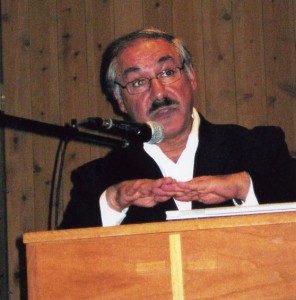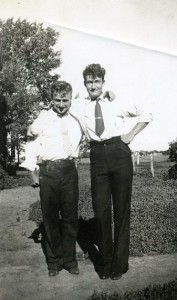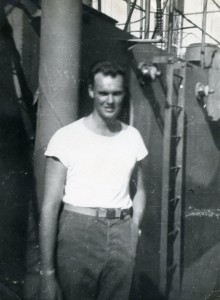See comment at end of post
Annelee Woodstrom is 83 years young today, and what a remarkable 83 years it has been. She’s one of my role models. What a life. What an example.
We saw her reading from her book “War Child, Growing Up in Adolf Hitler’s Germany” one week ago today. We were among 75 people in a church conference room, all listening carefully. You could “hear a pin drop”, literally. Each time I hear her speak, her presentation is more compelling and powerful.
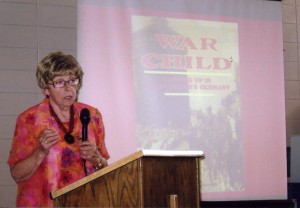
Annelee Woodstrom September 13, 2009
I met Annelee when I ordered a copy of her book in 2003. I had read a column about the book in the Fargo (ND) Forum, and sent her a note. We’ve been good friends ever since.
Annelee wrote the book when she was 77. It is about to go into its third printing. Last year, she wrote a followup, Empty Chairs, about 60 years in the United States, beginning as a war bride of an American GI from northwest MN. Their marriage of 51 years ended with his death in 1998. Empty Chairs has also been a success for Annelee. She has a powerful story to tell. (
#mce_temp_url# for details about the books. Both are well worth reading.)
Annelee was 7 years old when Adolf Hitler came to power in 1933. She lived in a town of about 6,000 people within walking distance of what is now the CzechRepublic. There were two Jewish families in her town. Both were forced to leave, both survived. At the end of the war, Annelee was 18 and a telegrapher in Regensburg, and near the end of the war she and a friend walked 90 miles home: better to die at home than through the bombs, they felt. They like other Germans were starving. Earlier she had been under the carpet bombing of the allies and survived. The detonation caused severe hearing loss.
What had seemed to be a glorious war for Germany, re-building national pride and securing additional land and resources, had an inglorious end for the Germans. There’s a lesson in that for us.
In the official public accounts of the winners (as in schoolbook history) of WWII, the war usually begins with 1938; the U.S. engagement begins with Pearl Harbor, December 7, 1941. WWII ends with the surrender of Germany in May, 1945; and with Japan in September of that year. It was our heroic war, liberating good from evil. When asked when the Germans saw the end was coming, Annelee readily says “1943”. She was 16, then.
Annelee began her talk by recalling German history between the end of the “war to end all wars”, WWI, in 1918, and her birth in 1926. This was a time of destitution for ordinary Germans, rarely seriously discussed. The Nazis promised jobs and national pride and prosperity, and for a while produced on their pledge, especially for those who were loyal party members. Her parents refused to become party members, and refused her requests to join the Hitler Youth, whose parades and splendid uniforms enthralled her as a young girl.
There is almost literally a black hole in information about the privation of ordinary Germans after WWI. But it was this privation, and the resulting humiliation at the loss that probably were the major factors making ordinary Germans susceptible to Hitler and the Nazis propaganda.
Winners of wars write the always heroic official history; losers retain and pass down the memories and consequences of the loss. There is always a “black hole” – a story not to be told. Personal memory is powerful for the losers. There is no surrender of memory.
Annelee to her great credit remembers, and chooses to share.
Happy Birthday, Annelee!
**
Annelee’s s story last Sunday reminded me of an earlier story I had read about Germany in the aftermath of WW I.
This story came in the form of a November 5, 1923, letter written by my great-uncle Herman Henry Busch of Dubuque Iowa to a nephew in Germany. At the time, HH had lived in the United States for over 50 years and he was a prosperous land developer. The original letter was in German, and I had it and several others translated for a family history I first wrote in 1993.
In relevant part, here’s what HH Busch said about the consequence of WWI five years after it had ended. Bear in mind, he is writing from America, and at the time he writes has lived in the U.S. for over 50 years.
“The last letter [unavailable, apparently written in pre-war or WWI times] I counseled [a cousin] to shake the [German] dust from his feet and come over [to the U.S.]. It was the time when the bishop from Lemberg was taken into captivity by the Russians. He answered me that [Germany] had a good Kaiser and good times. My warning was justified.
The American millionaires and the government had loaned the Allies so many millions that against the will of the common folk, President Wilson was pulled into the War. England had nine million for newspaper propaganda (for war) in American newspapers about the brutal German and that the German-Americans had come to suffer under it, they were held for unpatriotic and were required to come before the court for little things as if they were pro-German[*]. The damned war was a revenge and a millionaire’s war and the common people had to bleed in this bloody gladiator battle. Yes, until now the world still has no peace because of the revenge of France [**].
So now the Catholics of America have a nine day novena for peace, in our beautiful Marian church. The novena ends on the feast of All-Saints Day. It would be desirable for the strong God of the warring armies to let justice reign here and give the whole world the peace so that, at Christmas, the world can experience peace and good will to all. We Americans must now bear the war debt of fifty billion through taxes and it makes me happy that you [Germans] do not need help us pay the war debt. The last occupation map that I saw had [his home area between the Ruhr and Netherlands] Borken on the borderline, is Borken occupied? Is Borken included in the occupied area or not? Where do the garrison occupation lines run near you? Was the harvest good? Are many people in the area in misery? What is your business? Who lives in my old home now. I forgot nothing of the beautiful hunting grounds of my youth. If the hunt is still as good as then, it would be my utmost wish to make a hunt there in Soison. Report also of your family. If Germany will become more divided through loss of the Rhinelands and the revolution of the socialists and communists [***] then there is still a crisis to get through, and we very surely hope that the whole confusion is soon rectified and order comes. If Germany had been able to overflow the American newspapers with propaganda during the war like England, then America would have been on Germany’s side instead of England’s and it would be in a completely different position now in the world. One hears that the need in the cities is big and farmers fare the best….” (page 271, Pioneers: The Busch and Berning Families of LaMoure County ND, 1991, 1993, 2005)
* – German-Americans, especially those who spoke German, were considered suspect in the U.S., much as the Japanese-Americans were considered suspect in WWII, and the Arab-Americans today. The old patters continue unabated. If we do the same things in the same ways we will always get the same results…but it is a very hard lesson to learn.
** – In another letter, HH recounts a story told by his grandparents about the early 1800s when Napoleon overran their homeland of Westfalia, and for a number of years they were governed by France. No love was lost for France by this German.
*** – H. H. does not define “socialist” or “communist” in his letter, and no later record is known from later writings. The Nazis did eliminate the communists as competition, and the more I learn about the Nazis, they were, rather than “socialist”, really a mother-lode for the capitalists of the day, both in their country and elsewhere. They were really the very epitome of the “military-industrial complex” which President Eisenhower feared in his farewell address to the U.S. Congress in January, 1961, and which is now a troubling reality. In his address, Eisenhower had actively considered adding reference to government to his phrase, but in the end did not.
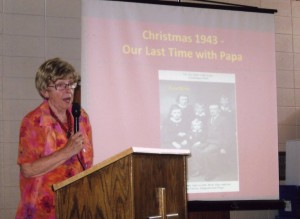
In background, Annelee's family in 1943
Annelee’s father was ultimately drafted into the German Army in a construction engineering capacity. Except for coming home around Christmas of 1943, he was never seen again. They believe he died in a Russian prison perhaps after the war, but no one is absolutely sure.
H.H. Busch died in 1933, the year Hitler came to power, and the Great Depression was raging in the United States. Except for the above letter, I have no further accounts by or about him.
UPDATE SEP 20, 2009 from Jim Fuller:
A key point in the piece is that the period between WWI and WWII is a “black hole” for most people, which means that they can have no real understanding of why the Nazis in Germany and Fascists in Italy rose so readily to power in their respective countries.
A painless way to gain considerable knowledge of that era, and have a great time in the process, is to read the novels of Alan Furst. They are superb, and beautifully written stories of spies and emigre intrigue in Europe between the world wars, but they also are filled with factual detail that one rarely, if ever, finds in history books. Another excellent novel that provides great historical insight is Erich Maria Remarque’s “Black Obelisque.” (Remarque was the author of “All quiet On the Western Front,” which in its early chapters also tells much about that between-wars period.

